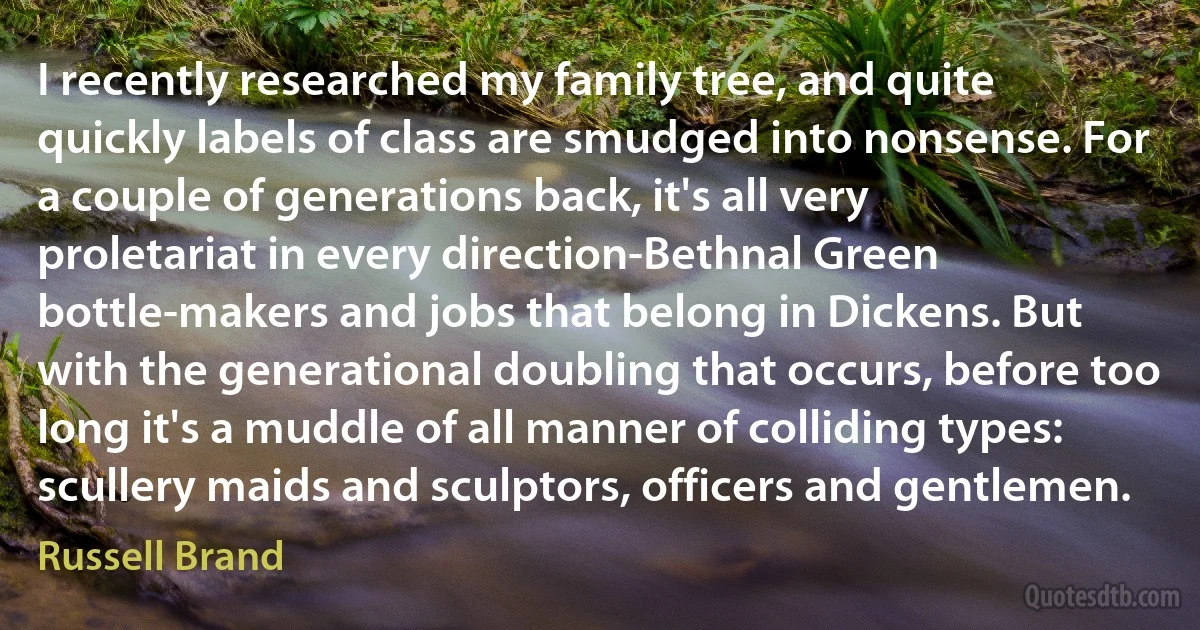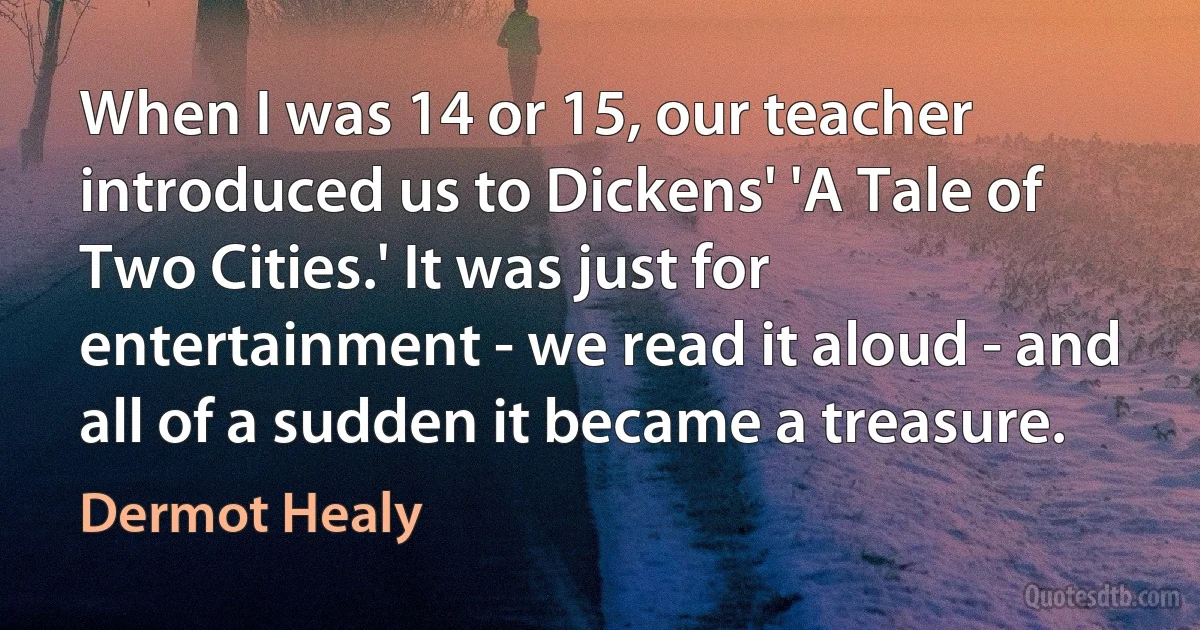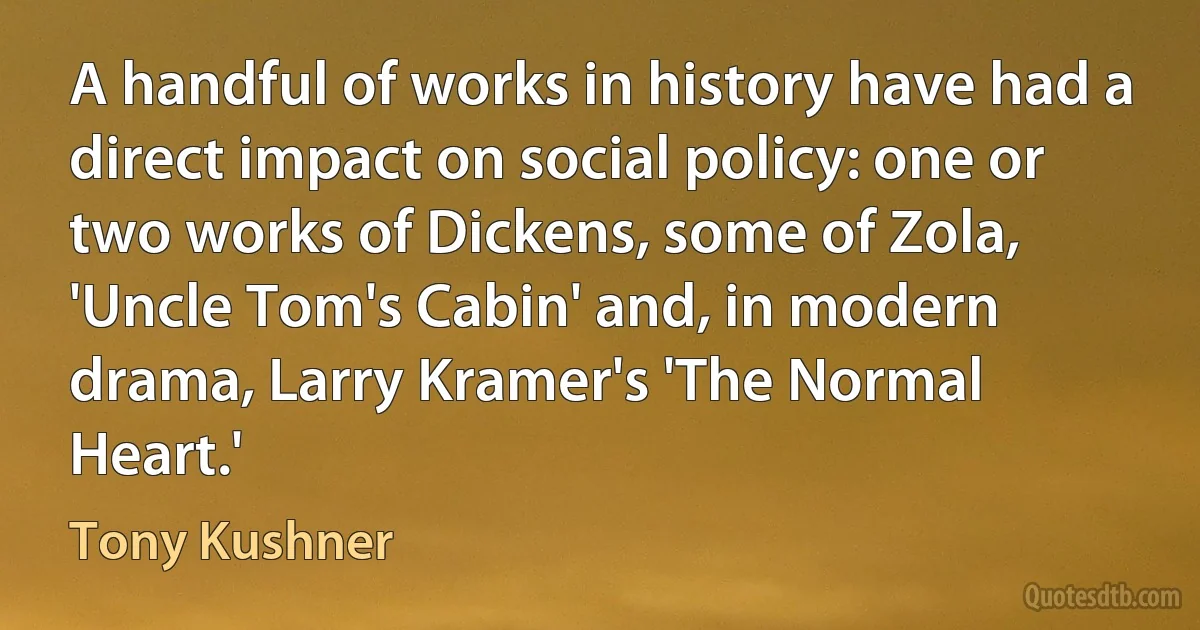Dickens Quotes - page 2
All Dickens is packed with orphans or people in uncertain relation to family groups, or clubs. It's impossible to read anything he wrote without feeling that the question of belonging was a major issue for him. He had to write about these matters. If we read Lovecraft's science-fiction horror stories, weird and unpleasant as they may be, they are all obsessively about fear of otherness-women's, people of other races', aliens'. All the over-heated horror of the books arises from this gut fear. He can't leave it alone. Whether or not we like the books and quite regardless of any verisimilitude, it's clear that the author is writing directly from his personal concerns. The stuff wasn't just constructed for a literary prize. A certain form of repetition, particularly the endless reformulation, in dozens of different guises, of the same core conflict is probably the hallmark of authenticity.

Tim Parks
What so impressed me on that first reading was the self-containedness of Tolkien's world. I suppose there are a few novelists who have created worlds that are uniquely their own -- Faulkner, for example, or Dickens. But since their world is fairly close to the actual world, it cannot really be called a unique creation. The only parallel that occurs to me is the Wagner Ring cycle, that one can only enter as if taking a holiday on a strange planet.

Colin Wilson
Writing stories was not easy. When they were turned into words, projects withered on the paper and ideas and images failed. How to reanimate them? Fortunately, the masters were there, teachers to learn from and examples to follow. Flaubert taught me that talent is unyielding discipline and long patience. Faulkner, that form – writing and structure – elevates or impoverishes subjects. Martorell, Cervantes, Dickens, Balzac, Tolstoy, Conrad, Thomas Mann, that scope and ambition are as important in a novel as stylistic dexterity and narrative strategy. Sartre, that words are acts, that a novel, a play, or an essay, engaged with the present moment and better options, can change the course of history. Camus and Orwell, that a literature stripped of morality is inhuman, and Malraux that heroism and the epic are as possible in the present as is the time of the Argonauts, the Odyssey, and the Iliad.

Mario Vargas Llosa
Books remained as in the eighteenth century, the source of life, and as they came out - Thackeray, Dickens, Bulwer, Tennyson, Macaulay, Carlyle, and the rest - they were devoured; but as far as happiness went, the happiest hours of the boy's education were passed in summer lying on a musty heap of Congressional Documents in the old farmhouse at Quincy, reading "Quentin Durward," "Ivanhoe," and "The Talisman," and raiding the garden at intervals for peaches and pears. On the whole he learned most then.

Henry Adams
My father, William C. Boulding, was a working plumber in business for himself. At the back of the house was the yard, a corrugated iron shed full of pipes, wrenches, and blow torches, and other mysterious and rather frightening apparatus. He had two faithful employees, Billy Fox, who was moody and regarded as a little queer, and Billy Sankey, who was short and cheerful. They and my father always smelled strongly of some kind of grease. My father was a gentle man. I never I never heard his voice raised in anger. He had had a very hard childhood. His father died soon after he was born; his mother married again, a man known in the family legends as "Pa Hardacre," about whom endless stories were told. He was a bigamist. He drove my father out of the house at the age of twelve to earn his own living on the streets of Liverpool. He constantly mistreated my half-aunts, Ethel and Rosie. He died before I was born, but my mother's accounts of him sounded like something out of Dickens.

Kenneth Boulding
"Prefer the familiar word to the far-fetched. Prefer the concrete word to the abstract. Prefer the single word to the circumlocution. Prefer the short word to the long. Prefer the Saxon word to the Romance." ... What excellent advice it is, and how it was beaten into my generation of schoolboys... But one may tire of even the best advice, as one may tire of writing according to these precepts. Would we wish to be without the heraldic splendour and torchlight processions that are the sentences of Sir Thomas Browne? Would we wish to sacrifice the orotund, Latinate pronouncements of Samuel Johnson? Would we wish that Dickens had written in the style recommended by the brothers Fowler, who framed the rules I have quoted; what would then have happened to Seth Pecksniff, Wilkins Micawber, and Sairey Gamp, I ask you?

Robertson Davies
Naguib Mahfouz, an Egyptian novelist who was the first Arabic writer to receive the Nobel Prize for literature and who was often considered the greatest writer in the Arab world... lived his entire life in Cairo, which provided the inspiration and backdrop for almost all of his writing... He set most of his works in the ancient Islamic quarter of Cairo, with its mosques and serpentine alleys teeming with shopkeepers, metalsmiths, government workers, peasants, prostitutes and thieves. His vibrant novels portraying life at every level of society were often likened to those of such other writers of urban social realism as Charles Dickens, Honore de Balzac and Emile Zola.

Naguib Mahfouz
I live in the Managerial Age, in a world of "Admin." The greatest evil is not now done in those sordid "dens of crime" that Dickens loved to paint. It is not done even in concentration camps and labour camps. In those we see its final result. But it is conceived and ordered (moved, seconded, carried, and minuted) in clean, carpeted, warmed, and well-lighted offices, by quiet men with white collars and cut fingernails and smooth-shaven cheeks who do not need to raise their voice. Hence, naturally enough, my symbol for Hell is something like the bureaucracy of a police state or the offices of a thoroughly nasty business concern.

C. S. Lewis
My office walls are covered with autographs of famous writers - it's what my children call my 'dead author wall.' I have signatures from Mark Twain, Earnest Hemingway, Jack London, Harriett Beecher Stowe, Pearl Buck, Charles Dickens, Rudyard Kipling, Alfred, Lord Tennyson, to name a few.

Debbie Macomber
I never understood people who said their greatest fear was public speaking, or spiders, or any of the other minor terrors. How could you fear anything more than death? Everything else offered moments of escape: a paralyzed man could still read Dickens; a man in the grips of dementia might have flashes of the must absurd beauty.

David Benioff



